#and making their judgments on their queer characters accordingly
Explore tagged Tumblr posts
Text
" AVE, TRUE TO CAESAR ! "

I am Vulpes Inculta of Caesar's legion. I serve my master as the greatest of his Frumentarii. I aim to spread the word of the Legion and destroy the profligate mind.


CHECK BELOW FOR BOUNDARIES + AUTHORS NOTES
This blog has no specific DNI and will block freely, however this is not a safe or welcoming space for Nazis, Zionists, Proshippers, or anybody of the sort.
Content Warnings.
POTENTIAL profanity, gore/violence, discussions of alcohol/drugs/sexual topics, homophobia (see authors note), fascism, slavery, and other abusive behaviors.
Topics deemed immediately triggering via description will be labelled accordingly in tags. ("TW: gore" or "TW: abuse")
Roleplay Boundaries
Asks, comments, and DMs are open indefinitely (unless stated otherwise) and are welcoming of all lengths/styles whether that be in or out of a character. I will do my best to respond with something relevant and match length. I will not respond out of character unless it requires such a response or I deem it necessary. DM roleplays should have technicalities discussed outright if they are going to be longterm. You can literally submit a sheet if you so please before we begin. In fact, I encourage you to. My boundaries here remain the same.
NSFW (by standard definition) asks are inevitable given the character and scenario. These are welcome and I WILL respond accordingly, but I will never be the one to engage explicit gore/sexual discussion. I will NOT respond to sexually obscene/explicit roleplays. Flat out. Implications, jokes, FtB, and suggestive scenarios are fine, but no porn. You will be ignored and if it happens frequently I will turn anon asks off for my own safety and comfort given I am 16.
Shipping and romantic interactions are fine, please do not interact like this if you will be upset by negative responses, slowburn, or denial. I cannot see Vulpes as an openly romantic person. I will not be the one to engage a ship roleplay unless it is explicitly communicated. Again, I am 16 and trusting you to moderate your own content consumption. I will simply move on if uncomfortable.
AUs and crossfandom roleplays are fine and encouraged. If there are technicalities I should be aware of, you may submit them accordingly. For ask box roleplays, you may submit details in dms or a seperate ask if you wish so long as you make it clear whom you are. The more details the better, so I can understand where to go in the roleplay.
Character details that I express in the designated space are SET IN STONE across the entirety of the blog. I may make minor exceptions for AU scenarios and DM roleplays.
WHEN IN DOUBT, just ask! I am generally open minded and non judgmental. It is better to be safe than sorry. I would rather you ask me a really weird and strange question than you feel pressured to restriction or accidentally send me something uncomfortable.
Author's Note
Please keep in mind that I am roleplaying a less than morally stable character. The responses I offer likely do not reflect my own personal values and beliefs, so please do not assume this of me. This being said, I will avoid any topics and phrases that may be immediately offensive or harsh to bystanders. Topics such as homophobia may be more common, because I am a queer person and feel more comfortable in it. I will never use slurs or targeted derogatory language. I am flat out uncomfortable with misogyny and will probably avoid roleplaying it outright.
YOU MAY RECOGNIZE MY ACCOUNT. I WAS ORIGINALLY UNDER THE URL @frumentariifox. SADLY, AFTER SOME EMAIL COMPLICATIONS AND FIGHTING WITH TUMBLR'S HELP TEAM, MY ACCOUNT WAS DEACTIVATED AND LOST.
Character Info
Anything non-canon or uncommon information
This rendition of Vulpes does use the initial short wavy white hair design. I generally add a tail latched to his belt to match his hat for aesthetics and humor. He wears these items most places. Sorry, furry inculta haters.
Vulpes has no explicit sexuality, but he is a heavily closeted transgender man. This is rarely mentioned unless relevant and I am not forceful of the topic, but I ask that you be respectful out of character. He is defensive and will deny queerness given the circumstances of the legion. Vulpes is pre-op, working out and making extra point to shape his body to legion standard.
Yes, his strip hat is too big for his head.
There may be more to be added and a potential reference sheet coming.
13 notes
·
View notes
Text
Exactly @loki-us. Great gifset for the receipts!
It's also important to note that Mobius is the only person Loki doesn't need OB's TemPad for when "getting the band back together". He uses the TemPad to return to everyone else on purpose, including Sylvie (you can hear the time door opening and closing off screen).
When everyone spaghettifies, Sylvie's words "Do you think what makes a Loki a Loki is that we're destined to lose?" triggers Loki's emotions to control his timeslipping for the first time. But the question becomes, what is Loki afraid of losing?

And it is then that Loki arrives at the right answer: it is not when, what, how, or why, but who, and director of photography very pointedly holds the camera behind Don/Mobius as Loki says this before finally turning to Sylvie, who was the last person who pressured Loki for his true answer earlier in the episode.

One of the key differences between our two main Loki variants is that Sylvie was orphaned as a young child and has survived through apocalypses. She has never had the opportunity to live as herself in a society, and accordingly, she has never had to bend herself to society's judgment or supress her wants. Sylvie is very aware and blunt about what she wants and is unafraid of pursuing those wants without restraint.

It is telling that the script does not have Sylvie say, "with me." Their romantic relationship, as far as she is concerned, is not feasible because the TVA ruined her life and Loki, to her chagrin, loves the TVA (or rather the people of the TVA), of whom Mobius is the most important person to him.

Sylvie also knows what Loki means to Mobius and outright points out to Loki the genuineness of Mobius's feelings in S1E5:

It is with this combined knowledge that Sylvie knows that Loki's first answer, "to stop he who remains", is a cop out. She is not satisfied until Loki answers, "I want my friends back." Sylvie honestly could have drilled down deeper to the specific friend. What we've been shown in the series indicates she knows the answer beneath the answer.
Loki, who has lived what could be considered a "normal life" until Thor 1, has been othered and consequently learned to suppress and even outright reject parts of himself. This is why Loki struggles to answer Sylvie honestly, and Sylvie loves him enough to lead him to the real answer, whether she likes it or not. The narrative tells us Loki wants his friends back. That's a truthful response, but it somehow does not feel strong or specific enough.
The censorship put in place by studio executive power, which bends to the whims of capitalism, stifles creative honesty. As much as possible, we should please avoid blaming the artists because they are the lowest in the hierarchy of Hollywood power. The artists--the writers, actors, directors, set and costume designers, lighting team, and composer--have to find subtler ways to tell this queer story as a team. Whatever contradictions may appear is the direct result of corporate greed.
The true answer, which remained silent, can only be shown visually in the final moments of the finale. The final moments of the finale, like the final moments of a stage play, are a means of each character to say goodbye to the audience in descending order of importance. The final 2 characters we say goodbye to have traditionally been reserved for the lovers. We see this exact visual mechanic used in the Legend of Korra. we see Mako (Korra's former lover; a la Sylvie) is the third to the last to exit the stage before we are left with Korra and Asami.

Likewise, after squeezing Mobius's shoulder, Sylvie exits the stage and leaves the audience with a private moment between Loki and Mobius.




Out of all the places Loki time slips in 2x5, he really was just trying to get back to Mobius the entire time.
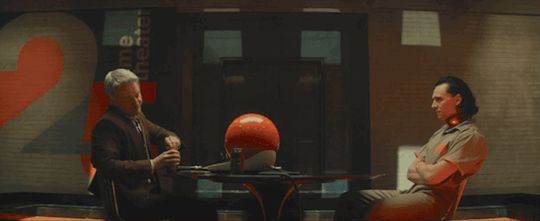
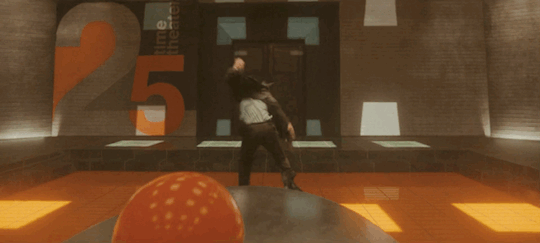
Time theater 25 where Mobius first took Loki in 1x1
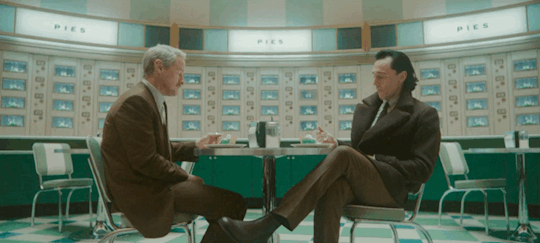
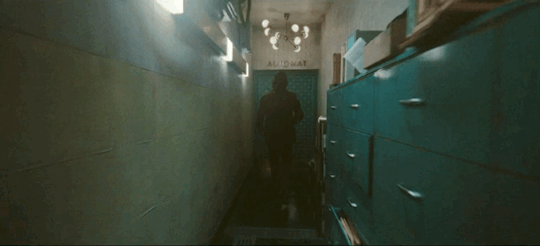
The room with all the key lime pies where they shared a snack in 2x2


He appears at the store Don works at not once, but twice before finally going in

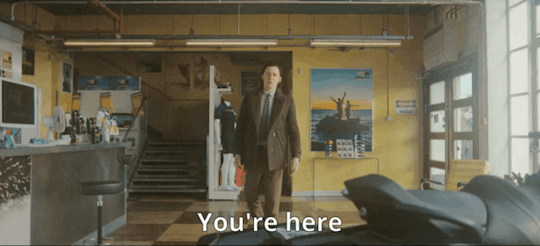
Out of all his friends, Mobius is the one he’s most relieved to see
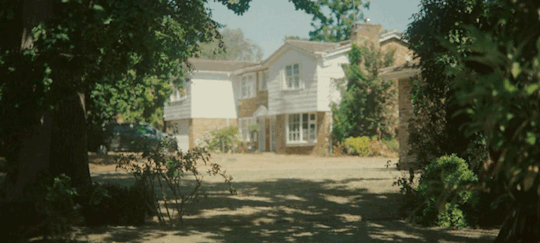
And then finally finds him again, appearing right in Don’s front yard
#nice meta loki-us#loki#Mobius#lokius#loki series#loki season 2#loki meta#loki analysis#sylvie#loki-us meta#my meta#loki-us analysis#my analysis
663 notes
·
View notes
Note
Only you people woukd ship a badass woman like val with a misogynist like loki. Common sense isn't popular in your circles it seems
Did you just use misogynist and Loki in a sentence!? lmfao! Do you even realize how ridiculous this message make you sound!? Do you even know what “common sense” means? It means “The basic level of practical knowledge and judgment that we all need to help us live in a reasonable and safe way.”
So accordingly, having common sense means to have an ability to understand that Loki isn’t a misogynist. First because of his close relationship with his mother and the amount of respect he has for her, second because every time he was in his right mind he treated women with respect, third he sent Lady Sif to missions on Earth and it shows he had complete trust in her abilities more than any one of W3, fourth he is a queer coded character ffs!
Also having common sense means not trolling people over their ships. In fact common sense means not sending people anon hate at all. You would know that if you had any common sense. Guess I hit a nerve with one of my posts and you couldn’t find anything else to attack me with. lol!
66 notes
·
View notes
Text
So it occurred to me that some people in the Rebecca Front fandot might be hesistant about reblogging yesterday’s really great interview with her, since it was posted on The D@ily M@il. So, I’ve taken the liberty of copying the transcript here (below the cut) so that people can still read it without that controversial site in their browser history.
'Sex symbol? I’ve still got it!': Actress Rebecca Front on body confidence and what she's got in common with Theresa May
By KERRY POTTER FOR YOU MAGAZINE
From The Thick of It to War & Peace, REBECCA FRONT’s talent for portraying powerful women has won her legions of male fans. She tells Kerry Potter about body confidence, her (teenage) fashion mentor and what she’s got in common with Theresa May.
Rebecca Front is fixing me with The Look. Even the most cursory of TV viewers will be familiar with it: stern and authoritative, as seen on Chief Superintendent Jean Innocent in ITV crime drama Inspector Lewis (three years on from Rebecca’s departure, her co-star Laurence Fox still calls her ‘ma’am’).
She also deployed it in her role as cabinet minister Nicola Murray in the BBC political satire The Thick of It, as well as in her matriarch roles in period dramas War & Peace and Doctor Thorne. And now The Look is back for Rebecca’s turn in Kay Mellor’s new register-office-set BBC One drama Love, Lies and Records. She plays Judy, an awkward, jobsworth registrar who is furious when she gets overlooked for promotion in favour of her nemesis: gregarious, chaotic working mother Kate, played by Ashley Jensen.
Right now, I am nervously witnessing an impromptu demonstration of The Look up close. We won’t call it ‘resting b**ch face’ because Rebecca doesn’t like the word b**ch: ‘We wouldn’t call a man that.’ We settle for ‘resting angry face’.
‘It’s useful to be able to look quite scary,’ she says. ‘I’m really bad at complaining about things in shops or restaurants because I don’t like confrontation, but sometimes I don’t need to complain because you can just see it in my face.’ And with that, The Look is gone as she breaks into a grin. ‘I am quite a smiley person; I’m actually not stern enough. I’m quite soft and woolly by nature.’
She’s also a million times sexier than many of her characters. ‘I’ve got much more body confident as I’ve got older. I’m fitter and more muscly. I go to the gym three times a week. My teenage daughter [Tilly, 16] has given me more self-assurance. We shop together a lot and I pick up clothes and say, “I don’t think I can get away with that.” And she says, “What does that mean? You’re setting yourself a rule and that’s ridiculous. You tell me not to do that, so why should you?” So I’ve upped my game: I dress more confidently, I carry myself more confidently. You only live once.’
She’s about to get her ears pierced for the second time in recent years, egged on by Tilly, having previously been too scared. That’s the only needle she’ll tolerate though – cosmetic surgery is a big no. ‘Women are under so much pressure: the thought that you have to change your body to be accommodated in society seems wrong to me. I’m hesitant to say I hate it because I don’t want to judge people for doing it – I understand the impulse – but it worries me.’
At 53, Rebecca is happy to look her age. ‘It bothers me that people aren’t allowed to grow old naturally because there’s a beauty in that. I know it’s a cliché but confidence is the sexiest thing and if more women felt confident about the way they looked, they wouldn’t need to have those procedures. It takes guts to say, “I’ve got wrinkles and crow’s feet and I’m not bothered about it. I quite like them, actually.”’
Her tendency to play powerful, brusque characters has won her a legion of male fans. ‘Some men are really drawn to authoritative women, aren’t they? I occasionally get messages from men asking for photos of my shoes because they probably imagine I’m wearing really scary stilettos. I mean, I am today, but usually I think, “Erm, do you want a picture of my trainers?”’
Her turn as Chief Superintendent Innocent especially caught people’s imagination, reportedly inspiring erotic fanfiction about the relationship between Innocent and Laurence Fox’s character DS James Hathaway. ‘I try not to engage with that stuff,’ Rebecca hoots.
Kay Mellor, creator of big-hearted, women-centric dramas such as Band of Gold and Fat Fighters, had the idea for Loves, Lies and Records when she attended a register office to record the death of her mother, noting how the location was a microcosm for life’s highs and lows. Accordingly, the first episode is a rollercoaster of emotion, as sad as it is funny, taking in births, deaths and marriages.
Despite appearances, Rebecca says she’s not made of stern enough stuff to work in that environment. ‘I wear my heart on my sleeve too much for a job like that. With all the deaths and babies, I wouldn’t last more than five minutes. I cry very easily since having my children.’ (As well as Tilly, Rebecca and her TV producer/writer husband Phil Clymer have 18-year-old Oliver.) Being a cry baby does have benefits though: ‘I’ve become a much better actor since I had children. It’s made me less self-conscious and opened up a fast-track to accessing my emotions.’
Creating Judy was a welcome challenge: ‘I thought, how on earth am I going to play this woman as I have nothing in common with her? She has no sense of humour, she’s antisocial, she’s judgmental. We would not get on at all. But I didn’t want to play her like a cartoon villain. She’s just complicated. She’s a human being and it’s my job to understand why she does what she does and find a way into her head.’
The careers of Rebecca and her co-star Ashley Jensen have bloomed in a similar way, with both making the successful transition from comedy to drama. On graduating from Oxford, Rebecca began her career in radio comedy in the early 1990s, working with Armando Iannucci (who went on to create The Thick of It) and Steve Coogan.
Moving into TV, Rebecca starred in the Alan Partridge canon, with shows such as The Day Today, and later in Nighty Night, Queers and The Catherine Tate Show. Ashley, meanwhile, made her name in Extras and Ugly Betty as well as, more recently, in Catastrophe.
‘I’m in awe of Ashley – those shifts she makes between comedy moments and moving moments are effortless,’ says Rebecca. The two bonded so well off-camera that at one point they had a giggling fit so epic, crew members filmed it on their phones.
The current state of politics, however, is less of a laughing matter for Rebecca. Does she wish they were still making The Thick of It? ‘Things have gone so mad it would be hard to find fictional ideas that were crazier than what we’re going through,’ she says. ‘Even Armando couldn’t top this.’
Having played Nicola Murray, she says she has more sympathy for politicians, especially female ones. Indeed, she’s more charitable about Theresa May than you might expect a left-leaning actor to be: ‘We judge women in public life in a different way. She gets criticised for her hair, for what she wears, for being unemotional – I don’t think that would get levelled at a man. I suspect she’s probably a very nice woman. I don’t know her but I don’t look at her and think, “She’s evil.” It’s not a job I’d want in a million years in this toxic political environment. She’s doing an incredibly difficult job.’
And the two women share one characteristic: being a bit square. When asked to share a secret, Rebecca pauses: ‘I’m hesitant about saying anything that will sound like May admitting that running through a wheat field was the naughtiest thing she’d ever done. After she said that, my children said, “Mum that’s you! That’s the answer you would have given!” I’m such a square. I was head girl at school and I’m so law-abiding. If I saw a wheat field I would only enter it if there was a sign saying, “Please run here.”’
Having suffered from anxiety since she was a child, growing up in Northeast London, Rebecca now campaigns on mental health issues as an ambassador for the charity Anxiety UK. Her claustrophobia was written into her role in The Thick of It in a scene where Nicola refuses to get into a lift and is memorably blasted by her spin-doctor colleague, the legendarily vitriolic Malcolm Tucker (Peter Capaldi), as an ‘omnishambles’ (a word, she notes with glee, that’s now in the Oxford English Dictionary).
How did Rebecca feel about her private, real-life issues becoming the butt of a joke? ‘I’ve found humour is the best tool to deal with anxiety. You can’t afford to take it too seriously because it just gets worse,’ she smiles. She still struggles a little with lifts and can’t see herself ever travelling by tube. ‘These days I check in every so often with CBT [cognitive behavioural therapy], maybe once or twice a year if I feel I need a reboot.’
With the tube off limits, she often travels to and from her North London family home by bus. ‘I find them very relaxing and you get great material on buses: people do and say funny things. Nobody expects to see actors on the bus so fans often tweet me to say, “I saw your lookalike on the bus today.” No, it was me!’
She is heartened by Princes William and Harry speaking out about mental health issues. ‘I thought it was great, bless them for doing that. I don’t think the stigma has entirely gone, but it’s really improved.’
But back to business. When it comes to work, Rebecca has never been busier. She’s just finished Down a Dark Hall, a supernatural movie starring Uma Thurman; she’s filming a TV comedy pilot next week, and she recently delivered the draft of her second book of personal essays, following 2014’s Curious. What’s left? ‘Oh, I’m still hugely ambitious,’ she says. ‘There’s loads of stuff I want to do: some Shakespeare, a lot more theatre and drama that will really stretch me as it’s only been in the past few years that I’ve really started to use my drama chops.’
What about playing a femme fatale? ‘I’d love to do that,’ she sighs. ‘But I don’t know if that’s going to come up because there’s still this ageist culture. People don’t think of you like that when you’re over 40. We had a lunch party at our house the other day and I was the youngest woman there. I looked around the table and thought, “Just look at all these fabulous, well-dressed, attractive, funny women in their 50s and 60s.” Why don’t we see that on TV very often?’ I can imagine she’d only have to give a room of casting directors The Look and that would change.
And regardless, she’s blazing a trail as the thinking-man’s sex symbol. ‘I’d be flattered to think that. I’ve still got it going on!’ she grins, slinking out of the door to her waiting car. The Prime of Ms Rebecca Front? You had better believe it.
Rebecca rates
Fashion picks-- I’m too cheap to spend thousands on a frock. When I won a Bafta [for playing Nicola Murray in The Thick of It], I wore a £100 dress from Coast. I like AllSaints, Zara and Asos, and I live in jeans and shirts.
Reading-- The Shock of the Fall by Nathan Filer. It’s told from the perspective of a young man trying to make sense of a life-changing event.
Best beauty product --My daughter introduced me to Mac’s Prep + Prime Fix + finishing spray. It sets your make-up and gives you a bit of a glow.
Listening to Political podcasts – Pod Save America and West Wing Weekly are my favourites. My son, who is travelling, listens too, and we message each other about them.
Breakfast --Avocado and poached eggs on toast – and it’s got to have chilli flakes, otherwise forget it.
Watching --The Shop Around the Corner, a little-known screwball comedy with James Stewart. It’s my favourite go-to feel-good film.
Guilty pleasure-- Hollywood Medium with Tyler Henry. I don’t believe it for a minute but I don’t care, it’s so much fun. I snuggle up with my daughter and watch it.
Most treasured possession-- A book in which I wrote down sweet things my kids used to say at bed time and bath time when they were little.
Tipple of choice-- A dry martini with an olive.
Describe yourself in three words-- Thoughtful, kind and funny – at least, I aspire to be.
Dream dinner-party guests-- We have quite a lot of them over already. Frances Barber is great company and a friend of mine. Ditto Barry Cryer – he’s hilarious. And Jane Austen would have been a hoot, I reckon.
How would you like to be remembered?-- As someone who brightened people’s day.
#rebecca front#inspector lewis#the thick of it#non-jean#hathocent#i'm still in shock about them mentioning the hathocent fanfiction and that she now knows it exists#i mean the d@ily m@il from what i gather is complete trash of the f@x news variety but still#as pathetic as both are it still feels like i'm being called out#like they're k*nkshaming me#but whatevs
16 notes
·
View notes
Note
I don't want to be disrespectful, but I don't understand your issue with sherlock and "queerbaiting." I'm all for representation in media, however, realistically not everyone is gay. John has said multiple times in the show that he isn't gay, and he was married to a woman. Two men are allowed to be close friends without having to satisfy a tumblr-worthy homoerotic fantasy. As I said, I fully support representation, but just because two characters aren't gay for each other doesn't make a show bad
There are many things I’d like to unpack in your ask, nonny.
It’s difficult to know where to begin. I’ll start by saying I’m glad you agree that queer representation is important. So let’s start there, with the textual representation of queer people in Sherlock.
The characters who are textually queer in Sherlock include:
-Moriarty (confirmed most recently in TFP when he jokes about his bodyguard having ‘more stamina, but is less caring in the afterglow’), -Irene Adler (established as gay during the Battersea scene with John, in which to his assertion that he’s not gay, she replies, “well I am. Look at us both.” More on John later. She also nonconsensually drugs and whips Sherlock, which I think is extremely out of character for a professional in the kink community) -Culverton Smith (who has an honest to god hard on when he’s suffocating Sherlock and breathes his fear of death in and says in the most rapturous voice, “lovely”), -Eurus, (who suggests that the victim of her brutal rape could have been a man or a woman and she wouldn’t have noticed)-and to some extent Magnussen (who creepily kisses Sherlock’s hands, among other weird bodily power things he does, like flicking John’s face).
Perhaps you’ve noticed that this is a list of villains, all of whom are queer coded, and most of whom to some extent have the hots for Sherlock and violate Sherlock’s bodily autonomy when he is otherwise incapacitated (other than Eurus, because equating queerness with incest would be a little much even for this show).
So for our queer representation on this show we get 6, count em, 6 queer monsters, 6 queer psychopaths.
Forgive me if I’m less than thrilled about this.
BUT I was willing to overlook this, I was willing to forgive this, because to my view, the plot was inching forward towards a realistic portrayal of queer love—a nuanced and hard won happy ending, a love narrative that would speak to the complexities of human nature and queer identity.
Let’s turn to that question for a while. Queerness does not exist in a vacuum. It exists within a highly oppressive heteronormative framework. And so when you tell me, John has said many times that he isn’t gay, I say unto you: so did I.
My only way of surviving a homophobic environment was to swallow whole the lie that I was straight, to try as hard as I could to believe I was straight. This is compulsory heterosexuality. The result of this doublethink was that I had no interest in romance or sex. But I publically feigned interest in men for many years. I worked hard to convince myself that I was straight and normative. I was trapped deep in a subconscious closet. We often talk about the closet being something that we know we’re in and we want to be out of it. But I tell you, I honest to god thought I was straight. I thought I would marry a man and have children and live in the suburbs. As it turns out, none of those things have happened, thank god. But I spent many years of my life telling people I wasn’t gay.
By the way re: John and his marriage to a woman, being married to someone of the opposite sex has virtually nothing to do with whether you’re gay or not in a world where visible gayness is met with violence, death threats (my gf has literally been chased with a knife), rape threats (this has happened at least three times that I can think of off the top of my head), judgment, discrimination, and hate. Also, many people, like a younger version of myself once did, believe that they are straight and do their best to act accordingly, including marrying someone and finding out later that they were wrong in doing so. All this being said, John could easily be bi or otherwise queer. Suggesting that his marriage to Mary should preclude any and all attraction to men or taking that as proof of straightness is frankly biphobic and erases the bi experience.
But let’s move away from the personal significancer of a John Watson coming out/discovering himself narrative, and towards addressing your other comments.
Regarding your comment, “Two men are allowed to be close friends without having to satisfy a tumblr-worthy homoerotic fantasy”: From my perspective, summing up what the Johnlock fandom does as “tumblr-worthy homoerotic fantasy” is infantilizing and doesn’t give full credit to the depth of thought and nuance that goes into these transformative works.
I can name on one hand the pieces of mainstream media that tell a story like mine. Blue is the warmest colour is one, Carol is another.
The work these fanfiction authors are doing for representation by taking mainstream stories and queeriung them is monumental. But it is still not mainstream media representation. And we deserve that.
And now we come to the queerbaiting portion of my response.
Tropes are what tell us what kinds of archetypal stories are being invoked in the telling of a new story. In TV, there are many different kinds of tropes: plot tropes, lighting tropes, musical tropes, dialogue tropes, camera angle tropes, etc. For example a long lingering gaze in television codes romance for us. It’s a romantic trope.
For more on tropes, here are some useful resources: http://thorinlock.tumblr.com/post/132779606878/romantic-shots-in-bbc-sherlock
http://ifyouhaveenoughnerve.tumblr.com/post/76422437022/the-unabridged-dictionary-of-johnlock-tropes-157
http://tvtropes.org/
As a culture, we tell a lot of straight white love stories that end happily. Most of our romantic tv tropes come from these stories.
As a culture, we don’t tell many gay stories, and usually when we do, they are tragic and someone dies (http://tvtropes.org/pmwiki/pmwiki.php/Main/BuryYourGays). A common trope in stories about lesbians that I hate is that one woman leaves the other for a man—and that’s supposed to be a happy ending.
The point is, the filming and story telling tropes of romance are all over this show and these characters. Close shots of them gazing into each other’s eyes, the soft looks they give each other when they think the other won’t notice, the soft lighting accompanying these scenes, the dialogue, especially in the scene in ASiP at Angelo’s. As an exercise, try imagining that scene if Sherlock were a gorgeous woman.
JOHN: So you’ve got a boyfriend then?
SHERLOCK: No.
JOHN: Right. Okay. You’re unattached. Like me. Fine. Good.(modified from this transcript )
And then John licks his lips.
This is where it becomes queerbaiting. When the BBC tweets “Sherlock’s in love, but with who?” in order to promote s4, in which Sherlock’s romantic life is not shown to be developing at all, that is queer baiting. And it’s cruel.
More on queerbaiting:
https://www.autostraddle.com/how-do-we-solve-a-problem-like-queerbaiting-on-tvs-not-so-subtle-gay-subtext-182718/
http://www.afterellen.com/tv/471593-lets-end-queerbaiting-2016
Basically, the idea of gayness between Sherlock and John is a running joke on the show, a joke which has no pay off. Perhaps your sexuality has never been thrown in your face, or laughed at. Perhaps you have never been threatened violence or stalked or whistled at. But I have experienced all of this, just for holding my girlfriend’s hand in public.
So in sum, we have a show using romantic film tropes in order to make a joke about my sexuality, a joke at the expense of the marginalized.
Of course I’m upset and angry.
If this is a show about an epic platonic male friendship, that’s fine.
(Epic platonic male friendship is the oldest, most done narrative in existence, by the way. This is an excellent if somewhat dry book about the cultural shift in the twelfth century from tales of epic brotherly love/devotion between knights to tales of chaste courtly love between men and aloof women).
But in that case, stop it with the romantic TV tropes, stop teasing queer fans on twitter, stop making homophobic “no homo” jokes for the straight audience to have a laugh at my expense, and for god’s sake, stop writing all of your villains as queer coded psychopathic monsters. Was that really necessary??? It’s homophobic and it’s bad, lazy writing, and we deserve better representation than that. We deserve more than psychotic gay villains and desperately unspoken hidden subtext and winks and nudges on twitter from the creators. We deserve real representation, no hinting, no winking, no implying. Real, textual queer representation.
My last comment to you, nonny, is this: Indeed, not everyone is gay. And neither is everyone straight. I’m tired of never seeing myself or any part of my identity reflected in mainstream media.
For more information about media’s skewed representation of the world, see this GLAAD report.
#anon#askbox#second ask ever?#queer representation#sherlock#queerbaiting#tv tropes#lgbt#also i don't know how to add a read more thingy#sorry its long
79 notes
·
View notes